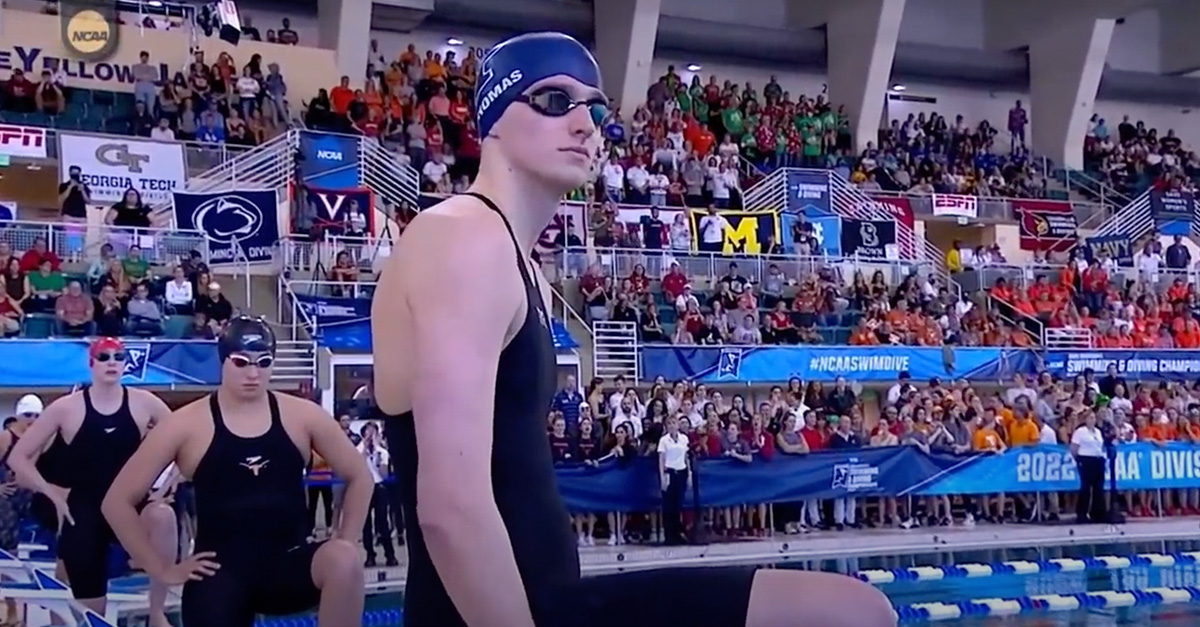


Get a free copy of Parental Rights & Education when you subscribe to our newsletter!

It shouldn’t have taken a panel of judges to rule that women’s sports are only for women, but as a result of their official decision, William “Lia” Thomas won’t be swimming in Paris this summer.
William “Lia” Thomas, the transgender swimmer who sparked controversy after dominating collegiate women’s swimming and claiming a national title, has lost his case to compete against women in elite swimming competitions and the Olympics.
Thomas, 25, who adopted the name “Lia” in 2020, was ranked 554th among freestyle swimmers in men’s collegiate competition during his time at the University of Pennsylvania. His prospects dramatically changed when he started identifying as a woman.
Thomas entered women’s races and began crushing the competition, winning the NCAA national title in the women’s 500-yard freestyle in 2022.
Thomas’s inclusion in women’s swimming, as well as numerous victories in women’s competition by other male athletes identifying as female, has sparked backlash from female athletes and sports governing bodies.
This includes World Aquatics (WA), formerly known as FINA, which has a policy barring males who began transitioning after the Tanner Stage 2 of puberty, or around age 12, from competing in women’s events.
World Aquatics is the global governing body for swimming.
As such, Thomas is barred from competing in the Olympics as a female.
Thomas challenged the ban at the Court of Arbitration for Sport, which dismissed the case.
The panel of judges ruled that Thomas “is simply not entitled to engage with eligibility to compete,” noting that “since the athlete is not entitled to participate in ‘Elite Events’ within the meaning of USA Swimming Policy, let alone to compete in a WA competition,” then the athlete “is simply not entitled to engage with eligibility to compete in WA competitions.”
That means he won’t be competing in this Saturday’s Olympic swimming trials or in the Summer Olympics in Paris, which get underway on July 26.
World Aquatics praised the ruling, calling it a “major step forward” in protecting women’s sports. In a statement, the group said,
“World Aquatics is dedicated to fostering an environment that promotes fairness, respect, and equal opportunities for athletes of all genders and we reaffirm this pledge. Our policies and practices are continuously evaluated to ensure they align with these core values, which led to the introduction of our open category.
We remain committed to working collaboratively with all stakeholders to uphold the principles of inclusivity in aquatic sports and remain confident that our gender inclusion policy represents a fair approach.”
World Aquatics permits athletes who are female but identify as male to compete against males or to compete against females if they keep their testosterone level below a certain number.
Male athletes who identify as female and transitioned after age 12 must compete against men.
Riley Gaines, the former University of Kentucky swimmer who tied with Thomas in an event at the national championships and has since joined in a lawsuit against the NCAA over its policy of allowing males to compete against women, said on X,
“Great news! Lia Thomas won’t be able to compete in women’s category at the Olympics or any other elite competition. He has just lost his legal battle in Court of Arbitration for Sport ruling. This is a victory for women and girls everywhere.”

Will Thomas fairly accomplished something that few people do: he became a competitive collegiate swimmer in the men’s division. He wasn’t the best, but conceivably he did his best and improved his technique and times in the three years he competed as a member of UPenn’s swimming team.
But Thomas wanted to do more. He has stated that it was his lifelong dream to compete in the Olympics and win Olympic gold. While anyone can understand the disappointment of not seeing your dreams realized, the fact is, there are many women with similar dreams.
It was the dream of women swimmers to compete at the 2022 NCAA championships and enjoy a fair competition. It was the dream of many to win a national title or at least stand on the podium, but that chance was taken from them by a male with an unfair biological advantage.
Just like Thomas, there are girls and women around the globe who have also had lifelong dreams of competing at the highest levels of their fields. Those women likely trained day and night, meticulously watched their diet, honed their technique, and sacrificed their time and social opportunities, all to have a fair chance at competing in the Olympics and bringing home a medal for their country. The inclusion of Thomas and other males would have taken slots on Olympic and elite teams, and very likely medals, from those women.
No one is banning people who identify as transgender from competing in athletics.
If they want to compete, they must do so either in the open category or against those of their biological sex. That is the only way to maintain the integrity of competition and any sense of fairness.
If you like this article and other content that helps you apply a biblical worldview to today’s politics and culture, consider making a donation here.

